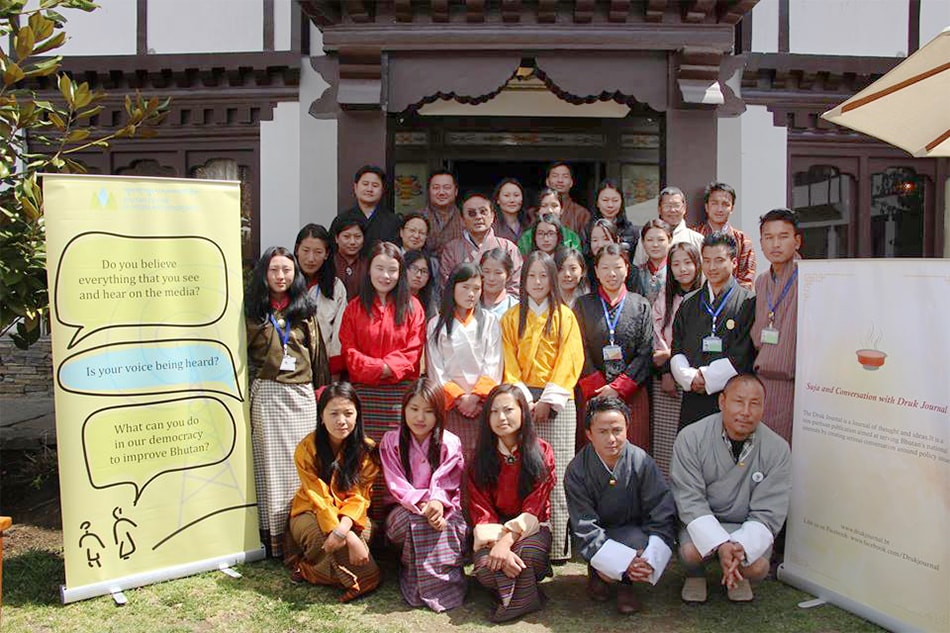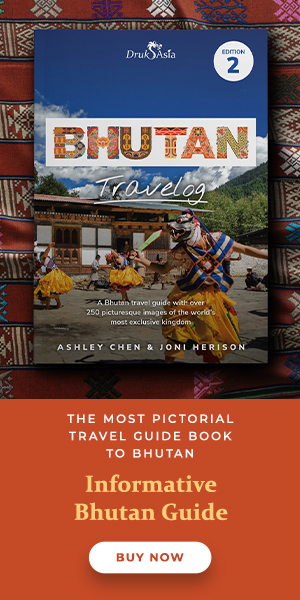Youth Matters – A Conversation in Paro
It is not even a town. It is a small settlement in Paro that you usually drive through in about three minutes. But at night the scene changes.

You don’t want to be on the wrong side of groups of youth who have had one too many drinks, smoked some roadside marijuana, or have indulged in psychotropic substances, or done all of them. The problems is, this is representative of many towns in Bhutan.
This was a powerful message when 48 men and women met in Paro and got into a conversation over the latest issue of BCMD’s Druk Journal, on the theme “Youth Matters”. As the group mulled over a number of thoughts and views on the situation of Bhutanese youth there was much to think about, and there were many reasons for Bhutanese society to be worried.
Twenty-one writers took an in-depth look at the people and forces shaping our youth, the inadequacy of our national youth policy, their dreams and aspirations, opportunities and facilities, the social media landscape, the democratic environment, and other perspectives. Writers from Mongolia, Denmark, and South Korea countries provided a comparative view of youth in their countries.
One Bhutanese writer pointed out that, in 11th century Tibet, there was no need for counselors. The Tibetan King, Ling Gesar, even groomed youthful “warriors” who overcame negative energy with positive energy and helped people tame their minds. Some of these young Bodhisattvas suppressed the evil that tended to disrupt society.
This was a marked contrast to today’s environment, as painted by other writers, a modern society crying out for psychiatrists, psychologists, and shrinks for nearly every aspect of our lives. Faculty members and trainees of the National Institute for Education in Paro, who formed a bulk of the discussion group, talked about the new services planned to initiate counseling, peer support, virtual learning and others.
This perception has, unfortunately, tainted the image of youth. While looking for writers for this issue, the Druk Journal team realised that the term youth is almost synonymous with “problems”. People talk about the “issues” related to youth. It was extremely difficult to get a writer to look at the dreams and aspirations of Bhutanese youth. Most wanted to write about unemployment, addiction, suicides, and the darker side of the topic.
When the Paro gathering discussed youth in the context of future and aspirations, one participant ventured to say that we are “cautiously hopeful”. The young, energetic, and economically productive group has to be tapped. Youth, and their opinions, have to be taken on board in all aspects of nation building and functioning of society. They cannot remain a passive and hesitant section of society.
“But we do believe that miracles happen.” This was a counselor from the Chithuen-Phendey Association, Sonam Tshering. He meant that some prodigal strays – addicts do overcome their addiction and come back to normalcy. This optimism, however, is a weak tone because the association mostly talks about how difficult it is get help and support.
The conversation covered “role models” and it appears that our teacher trainees, and perhaps teachers, are intimidated by their own positions as role models for students. So that left an open question… who are the role models for young Bhutanese? What do we look for in a role model?
Democracy
Questions, questions, questions…
We agreed that asking questions is an important part of governance. It is not anti-government… asking good questions is not anti-anything. In a democracy, you agree to disagree. And it is through debate that we build democratic culture and values.
Media are known as the fourth estate in a democracy, informally placed alongside the government, judiciary, and parliament. The participants noted that, when democracy was introduced eight years ago, the Bhutanese media asked many questions. But the questions have fizzled out. So people were turning to social media and the tide of social media raised the need for critical thinking.
The participants agreed that citizens had to take more responsibility in governance. One raised the example of central schools, saying that they did not understand the concept because it wasn’t discussed with them. It was generally agreed that people should question the government and provide feedback through the representatives who they voted for. This was particularly relevant because of the emphasis the government was now giving to local governments and decentralisation.
The young participants were advised to read about the Danish experience of the role of youth in politics, an article in the fourth issue of the Druk Journal.
An educationist pointed out that the school curricula in Bhutan was heavily academic. Co-curricular activities were given a “step motherly” treatment. Club activities were often sacrificed for other activities. There was an absence of healthy activities like drama and school concerts reflected the draying culture.
“The schools tend to look at our youth in terms of the way they are disciplined, given warnings, punished… When you meet a student who’s naughty do you punish the student or do you look at the root cause of his or her behavior?”
When guest speakers are invited to schools, they are usually government officials. Seasoned farmers, which represent the bulk of our population, and talented specialists like chefs, weavers, painters etc., are never invited to speak. The conclusion is that we tend to present civil servants as role models and forget that people from all walks of life can also provide the examples we need for youth.
The conclusion? We can achieve self-sufficiency in food and everything else. But if we don’t give the right education to our citizens, our future will not be very bright.
How about opportunities?
Why do Bhutanese professionals resign from their jobs and go to Australia to be sweepers? There is nothing wrong in being a sweeper, but after years of study and training a professional?
One of the more difficult topics for discussion was the question of dreams, opportunities, and realities – what are these? A cliché now is the comparison of sports and healthy recreation facilities and libraries with bars, drayangs, snooker rooms, etc.. Healthy services and facilities are outnumbered in the thousands.
The lack of support and opportunities is voiced most vigorously by the Chituen Phendey members and recovering addicts. Organisations and individuals are not keen to support even the most basic facilities and services for citizens who have fallen by the wayside. Trying to get back a normal life can be a major challenge.
It may be a simplistic interpretation but one conclusion the conversation came to was that there is no sense of community among the current generation of Bhutanese. We live in a hierarchical society and the so-called process of development has almost completely broken down existing social structures.
“ If a problem does not affect us personally, we tend not care about it,” says a teacher trainee.
From the perspective of, say, disadvantaged youth and recovering addicts, there is very little hope. And, as a result, we only care about ourselves.
This is ironic in a society that claims to be interdependent and connected, a country that is being asked to lead the world in terms of human values.
After three hours of this conversation, what did we take away? We were a little more informed, we heard some new ideas, and that’s where change begins. But what are we going to do about it?
Two specific answers came to mind. One young participant noted that we talk a lot but do nothing. This is an echo of His Majesty the King’s address to the nation: Bhutanese are good in planning, not good at implementing.
One article in the journal is called “Bhutan’s National Youth Policy: Another Gap Between Commitment and Output?”
One prophecy that continues to echo is “The future of the nation lies in the hands of the youth”. At an earlier Druk Journal Conversation, one participant disagreed with this. The future, he argued, lies in the hands of today’s policy makers, who are not the youth. Where does all that leave us?
Tempa Wangdi ( BCMD Journal)




